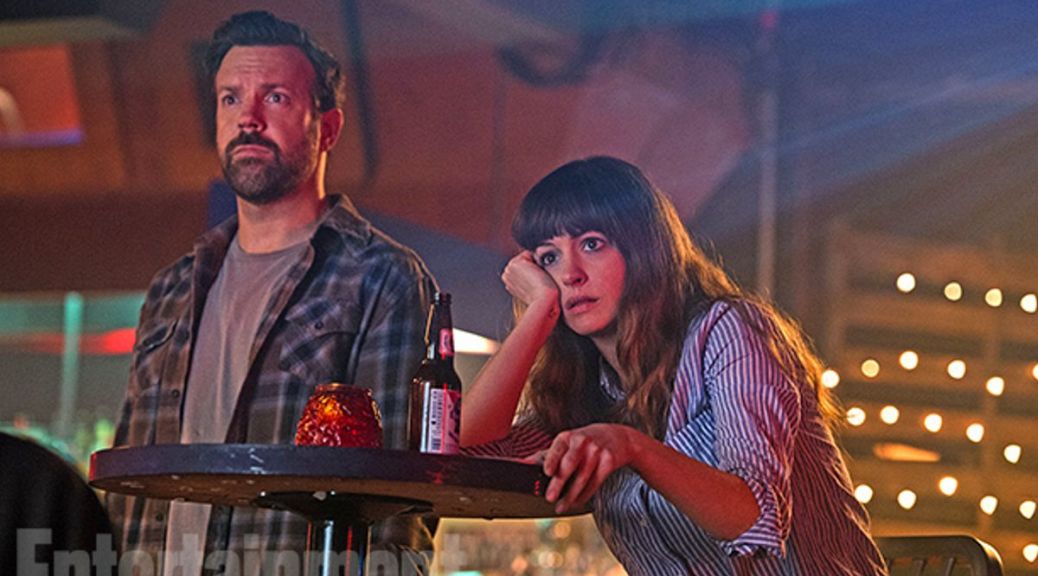Colossal masquerades itself as a certain type of movie. It opens on the ominous, lingering image of a Kaiju-like monster. Then, sweeping shots of the New York skyline play out over a driving, Dark Knight trilogy-esque score. Then, Gloria (Anne Hathaway) enters, hungover and rambling thinly-veiled excuses to her boyfriend (Dan Stevens) about where she has been.
It doesn’t quite match the previously set tone, does it?
When her boyfriend leaves her due to her drinking problem, Gloria moves back to her hometown, where she falls in with an old friend named Oscar (Jason Sudeikis). An old friend who just so happens to own his father’s bar.
Remember that Kaiju that I mentioned earlier? Whelp…turns out it pantomimes the actions of Gloria when she sets foot on a playground she knew once as a child. It pantomimes everything, including drunken falling that kills dozens of people in Seoul, Korea.
The whole thing isn’t the most subtle of symbols, but we’ll run with it.
Colossal begins as a film told through repetition. Fitting, given it is an alcoholism narrative. Gloria drinks, wakes up debilitatingly hungover, sees what has happened in Korea as a result of her night, and Oscar comes over with a piece of furniture.
When the film diverges from this pattern (what is narrative intrigue if not the breaking of a pattern), things become both more interesting and less narratively grounded.
A substantial portion of the film revolves around a certain character’s change, a revelation of a darker side to someone who initially appears genuine. The rather sudden change is too drastic for realism, even in a film about giant sci-fi monsters who fight each other.
Although, the depiction on the actor’s part is quite good from either side of the change.
Colossal harbors a strange mix of tones. It is at once a film working on classic East Asian science fiction tropes and a dark comedy with more horrifying underpinnings that disturb that comedy.
It is a film about violent weakness and volatile relationships. Interestingly, these themes function as a mirror: one character enters with them, then that character has to deal with them from the other side.
There are some fascinating moments in the film. Namely, a scene in a bar involving an over-sized firework, where the sizzling tension of the conversation easily outmatches whatever sparks the cylindrical firecracker can muster.
But the overall themes of the film do not play out as strongly as the isolated moments. Gloria seems to exhibit a learned helplessness near the “dark night of the soul” portion of the film, but it is a moment of submission to tyranny that seems to only exist within the scene in which it occurs (the aforementioned firework scene).
On either side of this scene, Gloria is openly pushing back against the thing that she chooses to keep close at the end of the scene. There is something inconsistent in her character, a crucial inconsistency that makes it harder to take the fantastic, pivotal scene at face value.
The film at times seems to function in these inconsistencies by design. Sudeikis’ character is a bipolar split between the seemingly well-meaning and the domineeringly needy.
While this is a fascinating juxtaposition, where the externalization of the character is the result of projection at the hands of insecurities, it isn’t executed with the nuance such a character requires. Instead, he is rendered a simple antagonist. The internal conflict is left behind.
Hathaway’s character survives with enough nuance to make her a functioning protagonist, but she also exhibits shifts that seem to serve the plot more than the reality of the narrative world.
Both actors give performances that make these character shortcomings hard to spot, and the overall impact of these character arcs is something that transcends the quirk of the film’s central gimmick.
But the metaphor that the film is working with never truly gets a coherent realization in the kaiju symbology and the oppression/repression storyline. It is a thematic subtext that can be massaged out quite easily, but it doesn’t fit with the world of the film at every turn in a logical way.
Colossal: B
As always, thanks for reading!
Like CineFiles on Facebook for updates on new articles and reviews.
—Alex Brannan (@TheAlexBrannan)


I have to watch all of Sudeiki’s movies, he’s one of my favorites! Thanks for the review 🙂
LikeLike
Thanks for reading! He has a surprising amount of range for a comic actor, which is on display in Colossal. Have you seen Sleeping With Other People? That might be my favorite performance of his
LikeLiked by 1 person
i haven’t! thank for the tip!
LikeLike